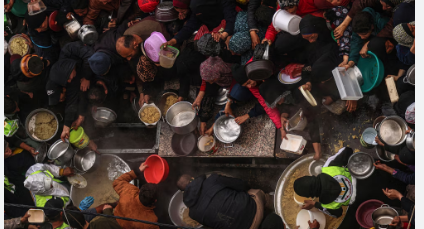New York (Web Desk): A recent food security assessment backed by the United Nations (UN) has revealed a dire situation in Gaza, where more than 1.8 million Palestinians are facing "extremely critical" hunger levels due to the ongoing Israeli military offensive.
The report indicates that approximately 70% of the region's agricultural fields have been devastated, leading to widespread loss of livelihoods.
According to the Integrated Food Security Phase Classification (IPC) system, around 133,000 individuals, or 6% of Gaza’s population, are currently experiencing Phase 5 food insecurity, classified as “catastrophic.”
This figure is expected to rise to about 345,000—16% of the population—between November and April, during the winter months.
The assessment warns that the risk of famine looms over the entire Gaza Strip, particularly in light of the escalating conflict.
During his Thursday’s regular news briefing in New York, UN Deputy Spokesperson Farhan Haq told reporters that UN Secretary-General Antonio Guterres has expressed deep concern about the report’s findings, highlighting high levels of displacement and the significant restrictions on humanitarian aid.
“One year into the conflict, famine is a real threat. This is unacceptable,” he stated.
Guterres has called on Israel to reopen all crossing points for aid and emphasized the need to remove bureaucratic obstacles that hinder the delivery of assistance. He also stressed the importance of restoring law and order within Gaza to ensure that UN agencies can provide essential humanitarian support.
The IPC assessment stresses that preventing a rapid descent into famine requires widespread access to adequate food, medical supplies, clean water, and basic services. It advocates for an immediate and unconditional ceasefire, restoration of local food systems, and improved management of malnutrition rates.
Furthermore, the report highlights the need to enhance feeding programs for infants and young children, promoting breastfeeding, and providing care for those who cannot be breastfed.
Despite significant challenges, including ongoing violence and evacuation orders, UN agencies are working to assist the people of Gaza.
The UN Food and Agriculture Organization (FAO) has prioritized reviving local food production and ensuring access to nutritious food, especially as the harsh winter approaches. Historically, the winter season in Gaza has seen increases in hunger and malnutrition.
Beth Bechdol, the FAO’s Deputy Director-General, stated, “To combat acute hunger and malnutrition, immediate action is required. We must halt hostilities and restore humanitarian access to deliver vital food aid and agricultural inputs before the winter planting season begins.”
The FAO has also raised alarms about substantial livestock losses, which are critical for the survival and livelihoods of many families in Gaza.
To mitigate this, the agency has launched a program aimed at protecting approximately 30,000 sheep and goats—about 40% of the region's remaining livestock. As of late September, FAO has provided fodder to over 4,400 livestock holders and veterinary supplies to around 2,400 herding families in Rafah, Khan Younis, and Deir al-Balah.
The organization stands ready to supply further essential resources, including more fodder, greenhouse plastic sheets, vaccines, and animal shelters, as soon as conditions allow for safe access.
“By ensuring the health of these animals, we can provide enough milk for all of Gaza’s children,” FAO emphasized.


